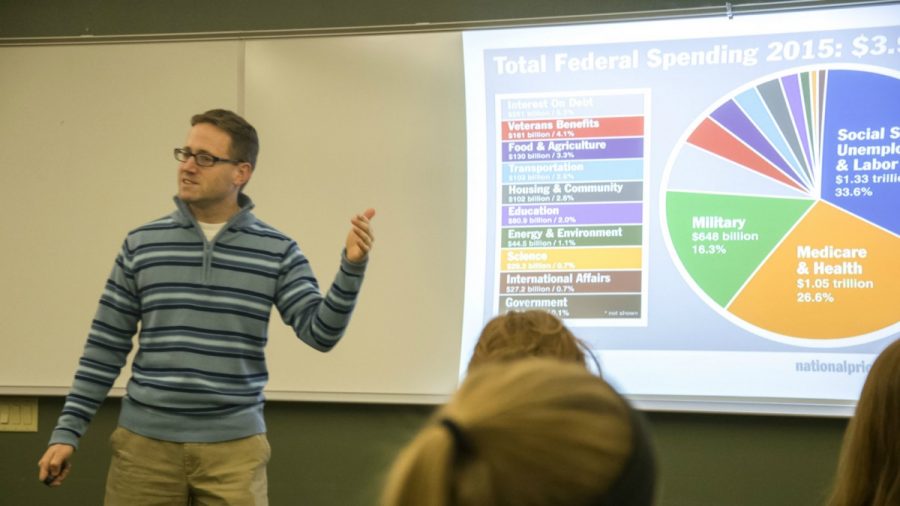Pizza and Policies: Forum makes sense of U.S. national debt
February 11, 2017
INDIANOLA, Iowa — The U.S. national debt stands at $19,953,801,856,484 — more debt than most college students can comprehend.
The first Pizza and Policies event of the spring semester took place Feb. 2 with speaker Kedron Bardwell, department chair of political science, who discussed the national debt, what it includes and some of the myths about lowering the national debt from both parties. Senior Alanna Wendt, a Culver Fellow, helped set up the event for students.
“It’s (Pizza and Policies) to reduce ignorance about these topics,” Wendt said. “It’s so people can understand the general idea of the impacts of national debt, which is something that affects all of us.”
Wendt said this series is important so that people could make more informed decisions.
“We want to have an informed electorate. People need to understand the issues before they go out and vote,” Wendt said.
During the event, Bardwell explained that the national debt is simply the relation between deficits versus debts and how much the United States spends versus how much they take in every year.
To date the debt is close to $20 trillion. That is about $60,000 for every person in the country.
Emily Schwickerath, a sophomore political science major, works at the Iowa state Capitol as a secretary. She already had a lot of knowledge on both the state and national debt, having just recently been in the Capitol during a more than $100 million budget cut. After Bardwell’s talk she thought one of the biggest takeaways was foreign aid funding.
“I think the important thing is just informing people that cutting our foreign aid is going to do nothing,” Schwickerath said.
Bardwell talked about some of the myths floating around from both parties about how they will lower the national debt, informing students that taxing the rich, cutting foreign aid and cutting funding for the arts would not make much of a difference in the larger picture. The places in the debt that accumulate are the military, Medicare/Medicaid and Social Security.
Students questioned Bardwell about whether the millennial generation should be concerned with the national debt, to which he responded: “Absolutely. I would get active. Especially during the caucuses, when they come around, pressure the candidates to have a plan.”
Schwickerath said students should come to events like Pizza and Policies because someday they will be in the real world, and they should care about what is going on around them.
“As students we forget that there is a world outside of our classes and activities and that when we graduate, we go out into the real world,” Schwickerath said. “You don’t have to know what’s going on, but if you don’t, the system will play you. Or you will get caught up in things you don’t know about.”
For more information on the national debt, Bardwell suggests taking his American Public Policy course.
Pizza and Policies began last spring semester and was spearheaded by Wendt and 2016 alumna Molly Monk.
Though no Pizza and Policies were done in the fall, Wendt said that her and the Culver Fellows plan to have more this semester to continue getting information out to students about important topics.







